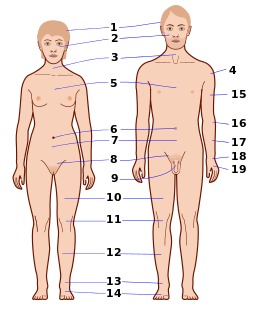head
English
Etymology
From Middle English hed, heed, heved, heaved, from Old English hēafod (“head; top; source, origin; chief, leader; capital”), from Proto-Germanic *haubudą (“head”), from Proto-Indo-European *káput-, a variant of *kapōlo- (“head, bowl”).
Pronunciation
- enPR: hĕd, IPA(key): /hɛd/
Audio (US) (file) Audio (UK) (file) Audio (file) - Rhymes: -ɛd
Noun
| Picture dictionary | ||
|---|---|---|
| ||
|
head (countable and uncountable, plural heads)
- (countable) The part of the body of an animal or human which contains the brain, mouth, and main sense organs.
- Be careful when you pet that dog on the head; it may bite.
- 1913, Joseph C. Lincoln, chapter 8, in Mr. Pratt's Patients:
- Afore we got to the shanty Colonel Applegate stuck his head out of the door. His temper had been getting raggeder all the time, and the sousing he got when he fell overboard had just about ripped what was left of it to ravellings.
- (people) To do with heads.
- Mental or emotional aptitude or skill.
- The company is looking for people with good heads for business.
- He has no head for heights.
- It's all about having a good head on your shoulders.
- Mind; one's own thoughts.
- This song keeps going through my head.
- 1935, George Goodchild, chapter 1, in Death on the Centre Court:
- “Anthea hasn't a notion in her head but to vamp a lot of silly mugwumps. She's set her heart on that tennis bloke […] whom the papers are making such a fuss about.”
- A headache; especially one resulting from intoxication.
- 1888, Rudyard Kipling, ‘Thrown Away’, Plain Tales from the Hills, Folio Society 2005 edition, page 18,
- he took them seriously, too, just as seriously as he took the ‘head’ that followed after drink.
- 1888, Rudyard Kipling, ‘Thrown Away’, Plain Tales from the Hills, Folio Society 2005 edition, page 18,
- A headdress; a covering for the head.
- a laced head; a head of hair
- An individual person.
- Admission is three dollars a head.
- 1749, Henry Fielding, chapter VII, in The History of Tom Jones, a Foundling. In Six Volumes, volume (please specify |volume=I to VI), London: Printed by A[ndrew] Millar, […], OCLC 928184292, book VIII, pages 196–197:
- […] but here we are obliged to diſcloſe ſome Maxims, which Publicans hold to be the grand Myſteries of their Trade. […] And, laſtly, if any of their Gueſts call but for little, to make them pay a double Price for every Thing they have ; ſo that the Amount by the Head may be much the ſame.
- Mental or emotional aptitude or skill.
- (animals) To do with heads.
- (uncountable, measure word for livestock and game) A single animal.
- 200 head of cattle and 50 head of horses
- 12 head of big cattle and 14 head of branded calves
- at five years of age this head of cattle is worth perhaps $40
- a reduction in the assessment per head of sheep
- they shot 20 head of quail
- The population of game.
- we have a heavy head of deer this year
- planting the hedges increased the head of quail and doves
- The antlers of a deer.
- (uncountable, measure word for livestock and game) A single animal.
- (countable) The topmost, foremost, or leading part.
- What does it say at the head of the page?
- 1913, Joseph C. Lincoln, chapter 10, in Mr. Pratt's Patients:
- Men that I knew around Wapatomac didn't wear high, shiny plug hats, nor yeller spring overcoats, nor carry canes with ivory heads as big as a catboat's anchor, as you might say.
- The end of a table.
- (countable) The principal operative part of a machine or tool.
- The end of a hammer, axe, golf club, or similar implement used for striking other objects.
- The end of a nail, screw, bolt, or similar fastener which is opposite the point; usually blunt and relatively wide.
- Hit the nail on the head!
- The sharp end of an arrow, spear, or pointer.
- The head of the compass needle is pointing due north.
- (lacrosse) The top part of a lacrosse stick that holds the ball.
- (music) A drum head, the membrane which is hit to produce sound.
- Tap the head of the drum for this roll.
- A machine element which reads or writes electromagnetic signals to or from a storage medium.
- The heads of your tape player need to be cleaned.
- (computing) The part of a disk drive responsible for reading and writing data.
- (automotive) The cylinder head, a platform above the cylinders in an internal combustion engine, containing the valves and spark plugs.
- The foam that forms on top of beer or other carbonated beverages.
- Pour me a fresh beer; this one has no head.
- (engineering) The end cap of a cylindrically-shaped pressure vessel.
- (Britain, geology) Deposits near the top of a geological succession.
- (medicine) The end of an abscess where pus collects.
- (music) The headstock of a guitar.
- (nautical) A leading component.
- (Britain) A headland.
- (social, countable) A leader or expert.
- The place of honour, or of command; the most important or foremost position; the front.
- 1708, Joseph Addison, The present state of the war, and the necessity of an augmentation, consider'd, page 33:
- We saw the last Campaign that an Army of Fourscore Thousand of the best Troops in Europe, with the Duke of Marlborough at the Head of them, cou'd do nothing against an Enemy that were too numerous to be assaulted in their Camps, or attack'd in their Strong Holds.
-
- Leader; chief; mastermind.
- I'd like to speak to the head of the department.
- Police arrested the head of the gang in a raid last night.
- 1913, Joseph C. Lincoln, chapter 7, in Mr. Pratt's Patients:
- “I don't know how you and the ‘head,’ as you call him, will get on, but I do know that if you call my duds a ‘livery’ again there'll be trouble. It's bad enough to go around togged out like a life saver on a drill day, but I can stand that 'cause I'm paid for it. What I won't stand is to have them togs called a livery. […] ”
- A headmaster or headmistress.
- I was called into the head's office to discuss my behaviour.
- (music, slang) A person with an extensive knowledge of hip hop.
- Only true heads know this.
- The place of honour, or of command; the most important or foremost position; the front.
- A significant or important part.
- A beginning or end, a protuberance.
- The source of a river; the end of a lake where a river flows into it.
- The expedition followed the river all the way to the head.
- A clump of seeds, leaves or flowers; a capitulum.
- Give me a head of lettuce.
- 2013 May-June, David Van Tassel, Lee DeHaan, “Wild Plants to the Rescue”, in American Scientist, volume 101, number 3:
- Plant breeding is always a numbers game. […] The wild species we use are rich in genetic variation, […] . In addition, we are looking for rare alleles, so the more plants we try, the better. These rarities may be new mutations, or they can be existing ones that are neutral—or are even selected against—in a wild population. A good example is mutations that disrupt seed dispersal, leaving the seeds on the heads long after they are ripe.
- (anatomy) The rounded part of a bone fitting into a depression in another bone to form a ball-and-socket joint.
- (nautical) The toilet of a ship.
- I've got to go to the head.
- (in the plural) Tiles laid at the eaves of a house.
- (Can we find and add a quotation of Knight to this entry?)
- The source of a river; the end of a lake where a river flows into it.
- A component.
- A beginning or end, a protuberance.
- Headway; progress.
- We are having a difficult time making head against this wind.
- Topic; subject.
- We will consider performance issues under the head of future improvements.
- (uncountable) Denouement; crisis.
- These isses are going to come to a head today.
- c. 1595, William Shakespeare, The Life and Death of Richard the Second, [Act V, scene i]:
- Northumberland, thou Ladder wherewithall / The mounting Bullingbrooke aſcends my Throne, / The time ſhall not be many houres of age, / More then it is, ere foule ſinne, gathering head, / Shall breake into corruption […]
- 1712 October 18, anonymous letter in The Spectator, edited by Joseph Addison, no. 513, collected in The Works of the Late Right Honorable Joseph Addison, Esq, Birmingham: John Baskerville, published 1761, volume IV, page 10:
- THE indiſpoſition which has long hung upon me, is at laſt grown to ſuch an head, that it muſt quickly make an end of me, or of itſelf.
- (fluid dynamics) Pressure and energy.
- A buildup of fluid pressure, often quantified as pressure head.
- Let the engine build up a good head of steam.
- The difference in elevation between two points in a column of fluid, and the resulting pressure of the fluid at the lower point.
- More generally, energy in a mass of fluid divided by its weight.
- A buildup of fluid pressure, often quantified as pressure head.
- (slang, uncountable) Fellatio or cunnilingus; oral sex.
- She gave great head.
- (slang) The glans penis.
- (slang, countable) A heavy or habitual user of illicit drugs.
- 1936, Lee Duncan, Over The Wall, Dutton
- Then I saw the more advanced narcotic addicts, who shot unbelievable doses of powerful heroin in the main line – the vein of their arms; the hysien users; chloroform sniffers, who belonged to the riff-raff element of the dope chippeys, who mingled freely with others of their kind; canned heat stiffs, paragoric hounds, laudanum fiends, and last but not least, the veronal heads.
- 1968, Fred Davis; Laura Munoz, “Heads and freaks: patterns and meanings of drug use among hippies”, in Journal of Health and Social Behavior, volume 9, number 2, page 156-64:
- The term, "head," is, of course, not new with hippies. It has a long history among drug users generally, for whom it signified a regular, experienced user of any illegal drug—e.g., pot "head," meth "head," smack (heroin) "head."
- 2005, Martin Torgoff, Can't Find My Way Home, Simon & Schuster, page 177,
- The hutch now looks like a “Turkish bath,” and the heads have their arms around one another, passing the pipe and snapping their fingers as they sing Smokey Robinson's “Tracks of My Tears” into the night.
- 1936, Lee Duncan, Over The Wall, Dutton
- (obsolete) Power; armed force.
- 1591, William Shakespeare, “The First Part of Henry the Sixt”, in Mr. William Shakespeares Comedies, Histories, & Tragedies: Published According to the True Originall Copies (First Folio), London: Printed by Isaac Iaggard, and Ed[ward] Blount, published 1623, OCLC 606515358, [Act I, scene iv]:
- My lord, my lord, the French have gathered head:
- (Can we find and add a quotation of Jonathan Swift to this entry?)
-
Quotations
- For quotations of use of this term, see Citations:head.
Gallery
 The human head.
The human head. A flower head.
A flower head. Head of a comet.
Head of a comet.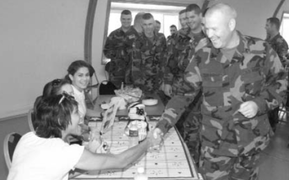 Head of the line.
Head of the line.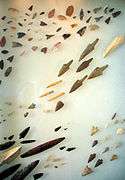 Arrow and spear heads.
Arrow and spear heads.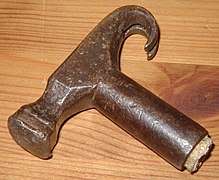 Head of a hammer.
Head of a hammer.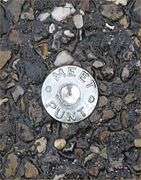 Head of a metal spike.
Head of a metal spike.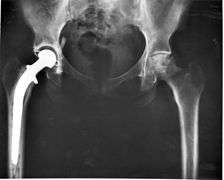 Head of the hip bone.
Head of the hip bone.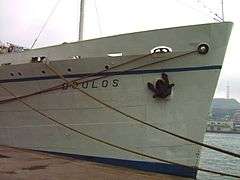 Head of a ship.
Head of a ship.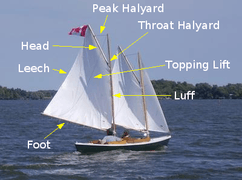 Head of a sail.
Head of a sail.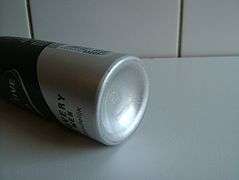 Head of a pressurized cylinder.
Head of a pressurized cylinder.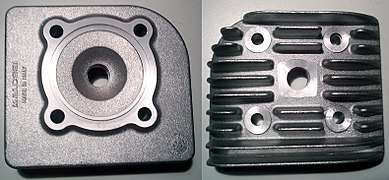 Head of a two-stroke engine.
Head of a two-stroke engine.- Hydraulic head between two points.
 A read-write head.
A read-write head.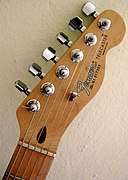 Head of a guitar.
Head of a guitar. Head of a drum.
Head of a drum.
Synonyms
- (part of the body): caput (anatomy); pate noggin (slang), loaf (slang), nut (slang), noodle (slang)noggin (bonce)
- (mental aptitude or talent): mind
- (mental or emotional control): composure, poise
- (topmost part of anything): top
- (leader): boss, chief, leader
- (headmaster, headmistress): headmaster m, headmistress f, principal (US)
- (toilet of a ship): See Thesaurus:toilet and Thesaurus:bathroom
- (top of a sail):
- (foam on carbonated beverages):
- (fellatio): blowjob, blow job, fellatio, oral sex
- (end of tool used for striking):
- (blunt end of fastener):
- See also Thesaurus:head
Antonyms
Usage notes
- To give something its head is to allow it to run freely. This is used for horses, and, sometimes, figuratively for vehicles.
Derived terms
Terms derived from head (noun)
- big head, bighead
- crackhead, crack head
- death’s-head
- hard head, hardhead
- head case
- headstart
- hold one’s head high
- keep one’s head
- level-headed, levelheaded
- rail head, railhead
- turk’s head
- acidhead
- addlehead
- ahead
- airhead
- beachhead
- bed head
- beetlehead
- behead
- blockhead
- bonehead
- bridgehead
- bubblehead
- bullhead
- bullheaded
- by a head
- chiphead
- chucklehead
- clearheaded
- cokehead
- cool head
- coolheaded
- crosshead
- deadhead
- deaths-head
- dickhead
- dopehead
- do someone's head in
- doughhead
- drowsihead
- drumhead
- dunderhead
- egghead
- eggheaded
- fathead
- featherhead
- forehead
- get one's head around
- give head
- godhead
- go to someone's head
- hardheaded
- hashhead
- have a head for
- have one's head read
- -head
- headache
- head and shoulders
- headbang
- head bang
- headbanger
- headboard
- headbutt
- headcarry
- headcase
- head cold
- headcount
- head down, bum up
- headdress
- header
- headfirst
- headforemost
- headframe
- headgear
- headhunt
- headhunter
- headily
- headiness
- heading
- headlamp
- headland
- headless
- headlight
- headline
- headliner
- headlock
- headlong
- headly
- headmaster
- headmistress
- head off
- head over heels
- headphone
- headpiece
- headpin
- headquarter
- headquarters
- head rag
- headrest
- headroom
- heads
- headscarf
- head-scratching
- headset
- headshunt
- headstall
- headstand
- headstock
- headstone
- headstrong
- heads up
- heads will roll
- headteacher
- head to head
- head to wind
- head trip
- head up
- headward
- headway
- headwear
- headwind
- heady
- hit the head
- hophead
- horsehead fiddle
- hothead
- hotheaded
- in one's head
- juicehead
- keep one's head above water
- keep one's head below the parapet
- knucklehead
- lighthead
- lightheaded
- longhead
- longheaded
- lose one's head
- lose one's head if it wasn't attached
- lowlihead
- maidenhead
- make head against
- muttonhead
- nethead
- notehead
- overhead
- pierhead
- pigheaded
- pillhead
- pinhead
- pisshead
- pothead
- print head
- puddinghead
- pull one's head in
- put a gun to someone's head
- puzzlehead
- puzzleheaded
- redhead
- redheaded
- roundhead
- shake one's head
- showerhead
- skinhead
- smackhead
- snap someone's head off
- softhead
- softheaded
- spreadhead
- strawhead
- subhead
- subheading
- suedehead
- thickhead
- thickheaded
- towhead
- turn heads
- turn someone's head
- weedhead
- wirehead
- wronghead
- wrongheaded
- you can't put an old head on young shoulders
Descendants
- Sranan Tongo: ede
Translations
Adjective
head (not comparable)
- Of, relating to, or intended for the head.
- Foremost in rank or importance.
- 1918, W. B. Maxwell, chapter 19, in The Mirror and the Lamp:
- At the far end of the houses the head gardener stood waiting for his mistress, and he gave her strips of bass to tie up her nosegay. This she did slowly and laboriously, with knuckly old fingers that shook.
- the head cook
-
- Placed at the top or the front.
- Coming from in front.
- head sea
- head wind
Synonyms
Antonyms
- (coming from in front): tail
Translations
of, relating to, or intended for the head
foremost in rank or importance
placed at the top or the front
coming from in front
slang: of, relating to, or for drugs or drug users
Verb
head (third-person singular simple present heads, present participle heading, simple past and past participle headed)
- (transitive) To be in command of. (See also head up.)
- Who heads the board of trustees?
- to head an army, an expedition, or a riot
- (transitive) To strike with the head; as in soccer, to head the ball
- (intransitive) To move in a specified direction.
- We are going to head up North for our holiday.
- We will head off tomorrow.
- Next holiday we will head out West, or head to Chicago.
- Right now I need to head into town to do some shopping.
- I'm fed up working for a boss. I'm going to head out on my own, set up my own business.
- How does the ship head?
- (fishing) To remove the head from a fish.
- The salmon are first headed and then scaled.
- (intransitive) To originate; to spring; to have its course, as a river.
- Adair
- A broad river, that heads in the great Blue Ridge.
- Adair
- (intransitive) To form a head.
- This kind of cabbage heads early.
- 1995, Anne Raver, “Gandhi Gardening”, in Deep in the Green: An Exploration of Country Pleasures, New York, N.Y.: Alfred A. Knopf, →ISBN:
- To be honest, this hasn't been my Garden of Eden year. […] The lettuce turned bitter and bolted. The Green Comet broccoli was good, but my coveted Romanescos never headed up.
- To form a head to; to fit or furnish with a head.
- to head a nail
- (Can we find and add a quotation of Spenser to this entry?)
- To cut off the top of; to lop off.
- to head trees
- (obsolete) To behead; to decapitate.
- 1822, Allan Cunningham, "Ezra Peden", in Traditional Tales of the English and Scottish Peasantry, v. 1, p. 37.
- I tell thee, man of God, the uncharitableness of the sect to which thou pertainest has thronged the land of punishment as much as those who headed, and hanged, and stabbed, and shot, and tortured.
- (Can we find and add a quotation of Shakespeare to this entry?)
- 1822, Allan Cunningham, "Ezra Peden", in Traditional Tales of the English and Scottish Peasantry, v. 1, p. 37.
- To go in front of; to get in the front of, so as to hinder or stop; to oppose; hence, to check or restrain.
- to head a drove of cattle
- to head a person
- the wind heads a ship
- To set on the head.
- to head a cask
Derived terms
Translations
to be in command of
|
|
to strike with the head
to move in a specified direction
|
|
to originate, as a river
|
|
to behead — see behead
- The translations below need to be checked and inserted above into the appropriate translation tables, removing any numbers. Numbers do not necessarily match those in definitions. See instructions at Wiktionary:Entry layout#Translations.
Translations to be checked
|
Related terms
This article is issued from
Wiktionary.
The text is licensed under Creative
Commons - Attribution - Sharealike.
Additional terms may apply for the media files.

